These protein-rich vegan overnight oats will set you up with solid morning nourishment. They offer nearly twenty grams of plant-based protein, along with fiber and Omega-3 fatty acids. This is a perfect make-ahead breakfast for busy folks or for anyone who struggles to make a nutritious morning meal a habit. Mix, refrigerate, wake up, and enjoy!
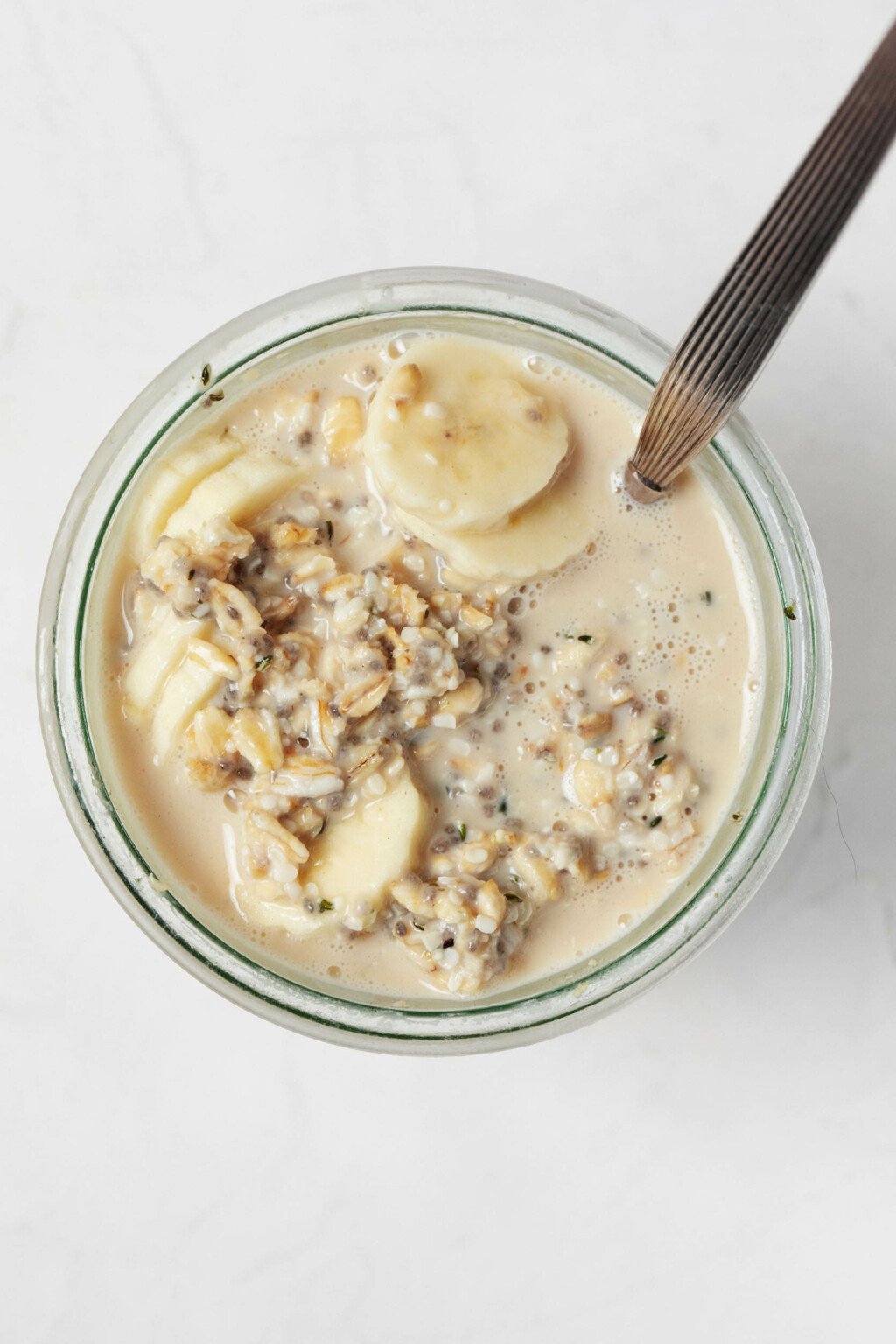
Last week, when I posted some cute vegan meal prep lunch boxes, I mentioned that consistency with lunch can be hard for busy professionals and parents.
The same can also be said of breakfast. And that’s why I’m sharing these protein-rich vegan overnight oats today.
Overnight oats are a breakfast that you can count on.
Anyone can go to bed at night with big plans for a nutritious breakfast in the morning, but life happens.
You might end up running late for work in the morning, struggling to get a child ready for school, or feeling more tired than you thought you’d be.
For all of these reasons and many more, plenty of people find themselves skipping breakfast. As a human who has her own struggles with time management, I get it.
As a registered dietitian, however, I know how important breakfast is.
A nutritious meal in the morning can set us up for peaceful appetite regulation, reliable focus and energy, and the assurance that we’re meeting our nutrition needs as the day goes on.
The solution? Breakfast options that can be meal prepped ahead of time, so that nothing will stand in the way by the time morning rolls around.
Overnight oats are an especially easy make-ahead option.
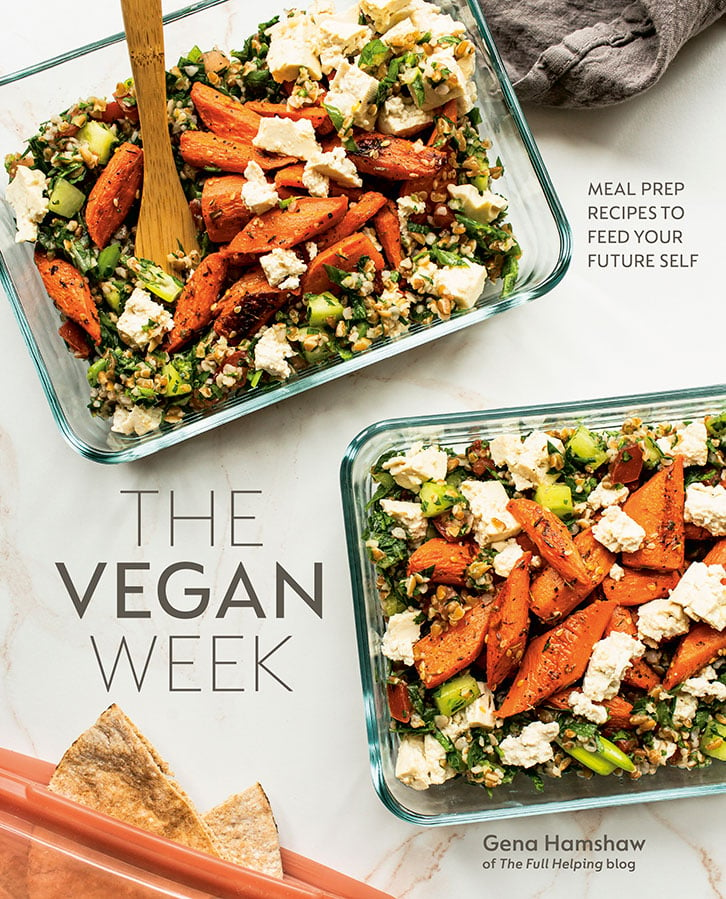
The Vegan Week
Embrace the joy of eating homemade food every day with the hearty and wholesome recipes in The Vegan Week.
Whether you have three, two, or even just one hour of time to spare, The Vegan Week will show you how to batch cook varied, colorful, and comforting dishes over the weekend.
What are overnight oats?
Even if oatmeal is a regular part of your routine, the notion of overnight oats may be new. What are overnight oats? How are they different from any other type of oatmeal?
Basically, overnight oats are oats that have been soaked in liquid for a long period of time, rather than cooked in heated liquid.
The oats still plump up and soften, yet they do this as a result of time, rather than temperature.
Overnight oats can contain ingredients aside from the oats and the soaking liquid. In fact, they’re a great “canvas” for flavor and texture.
Here’s a list of some of the components that I like to add to my overnight oats:
- Chia seeds
- Shelled hemp seeds (hemp hearts)
- Chopped or sliced nuts: walnuts, almonds, pecans, cashews, or pistachios
- Ground flax seed
- Raisins or goji berries
- Thinly sliced, dried apricots
- Chopped prunes
- Chopped medjool dates or salted date caramel sauce
- Vanilla extract or paste
- Mini chocolate chips
- Pumpkin purée
- Peanut butter or almond butter
- Berries
- Grated or chopped apples
- Ginger cinnamon baked apples
- Banana slices
- Spices: cinnamon, turmeric, or ground ginger
- Maple syrup or coconut sugar
- Cocoa powder
I’m probably forgetting quite a few mix-ins that I’ve tried over the years, but those are the ones that stand out to me.
The protein-rich vegan overnight oats that I’m sharing today feature the ingredient combination that I turn to most often: rolled oats, chia seeds, hemp hearts, maple syrup, and a pinch of salt.
It’s very simple, and as you’ll see, it packs plenty of plant protein.
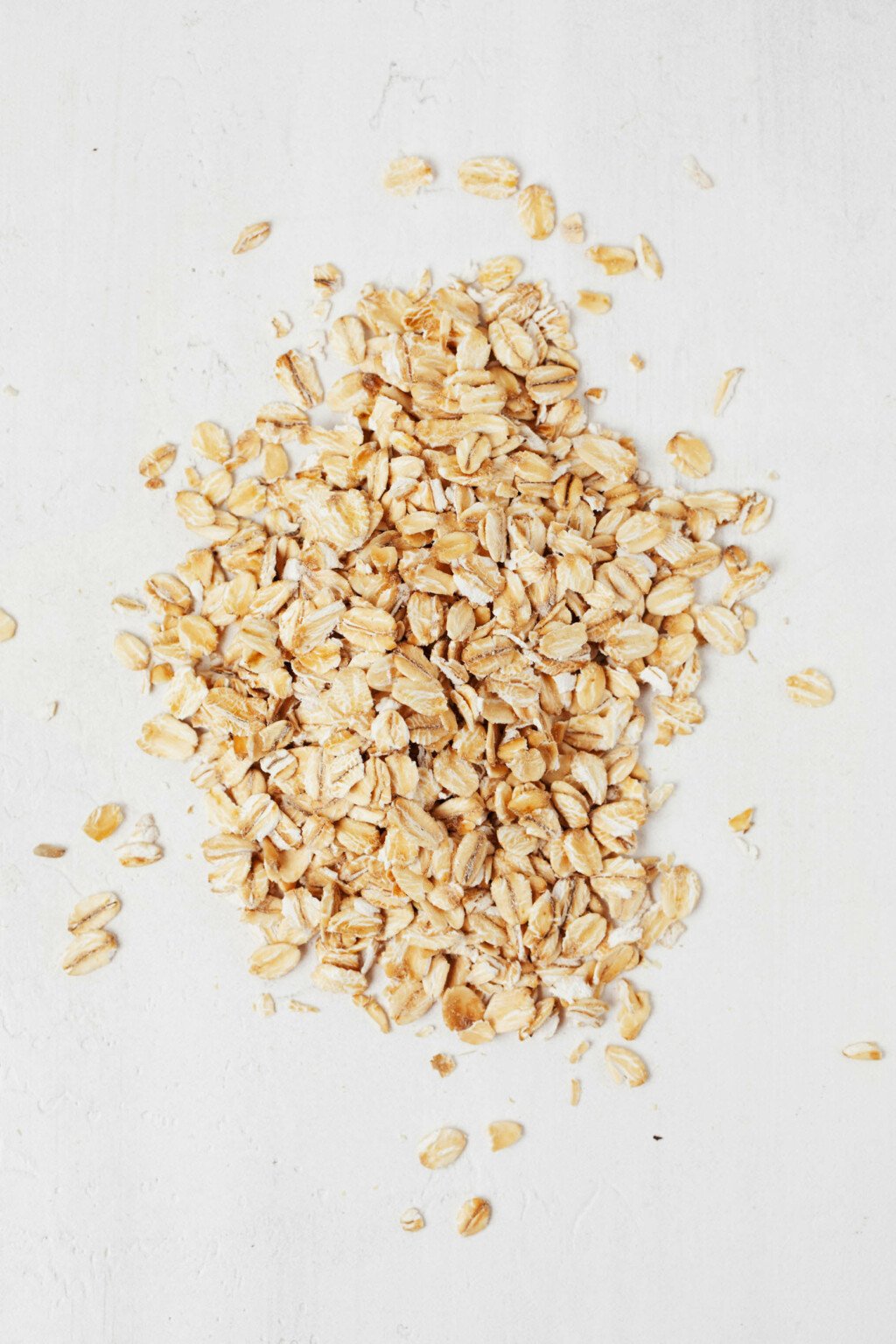
What sort of oats do you use for overnight oats?
In theory, you could use a few different types of oats.
I always use rolled oats for overnight oats, and I nearly always use them for hot oatmeal. Rolled oats, which are sometimes labeled as “old fashioned oats,” have my favorite texture of any type of oatmeal. I also like that they don’t take too long to cook (or soak).
However, it would be fine to use quick oats, which are thinner or have been steam-cooked longer than rolled oats, for this recipe.
Technically, you can use steel cut oats for overnight oats. They will be very chewy, and need more soaking time, than rolled oats.
While I enjoy steel cut oats sometimes—especially this savory steel cut oatmeal—their texture is less for me than the texture of rolled or quick oats.
Contrary to popular belief, steel cut oats aren’t substantively different in their nutrition from rolled oats, or even from quick oats. Sometimes they have a little more protein or fiber. But the difference, if there is one, is usually about one gram, give or take—not a huge deal.
Are overnight oats raw?
Clients have asked me in the past whether overnight oats are technically raw. If so, they wonder whether there’s any health issue associated with eating raw oatmeal.
If you make overnight oats with rolled or quick oats, the answer is no. If you soak them, rather than cooking them on the stovetop—as is the process for this recipe—they’re nevertheless not raw.
Rolled and quick oats have both been steamed prior to being packaged. If you choose to heat them in the microwave or in a saucepan, you’re only cooking them further.
Can I heat up overnight oats?
Absolutely! One of the nice things about overnight oats is their versatility. You can take them out of the fridge and eat them right away, cold.
You can also transfer them to a microwave or a small saucepan and warm them up.
Because the overnight oats have soaked for hours before that point, their texture is already thick and creamy. Heating simply serves to change their temperature, if you’re in the mood for something warm.
What liquid should I use to soak the oats?
The protein-rich vegan overnight oats that I’m sharing below call for soy milk, which is my top choice for its nutritional content.
However, other types of non-dairy milk will work for making overnight oats as well. I’ve used many, including:
- Oat milk
- Almond milk
- Hemp milk
- Cashew milk
- Coconut milk
- Pea milk (such as the Ripple brand)
In place of milk, you can also use a mixture of yogurt and water, which is what many recipes for traditional soaked muesli call for.
The muesli recipe in Power Plates calls for yogurt and grated apple, which provides some moisture of its own.
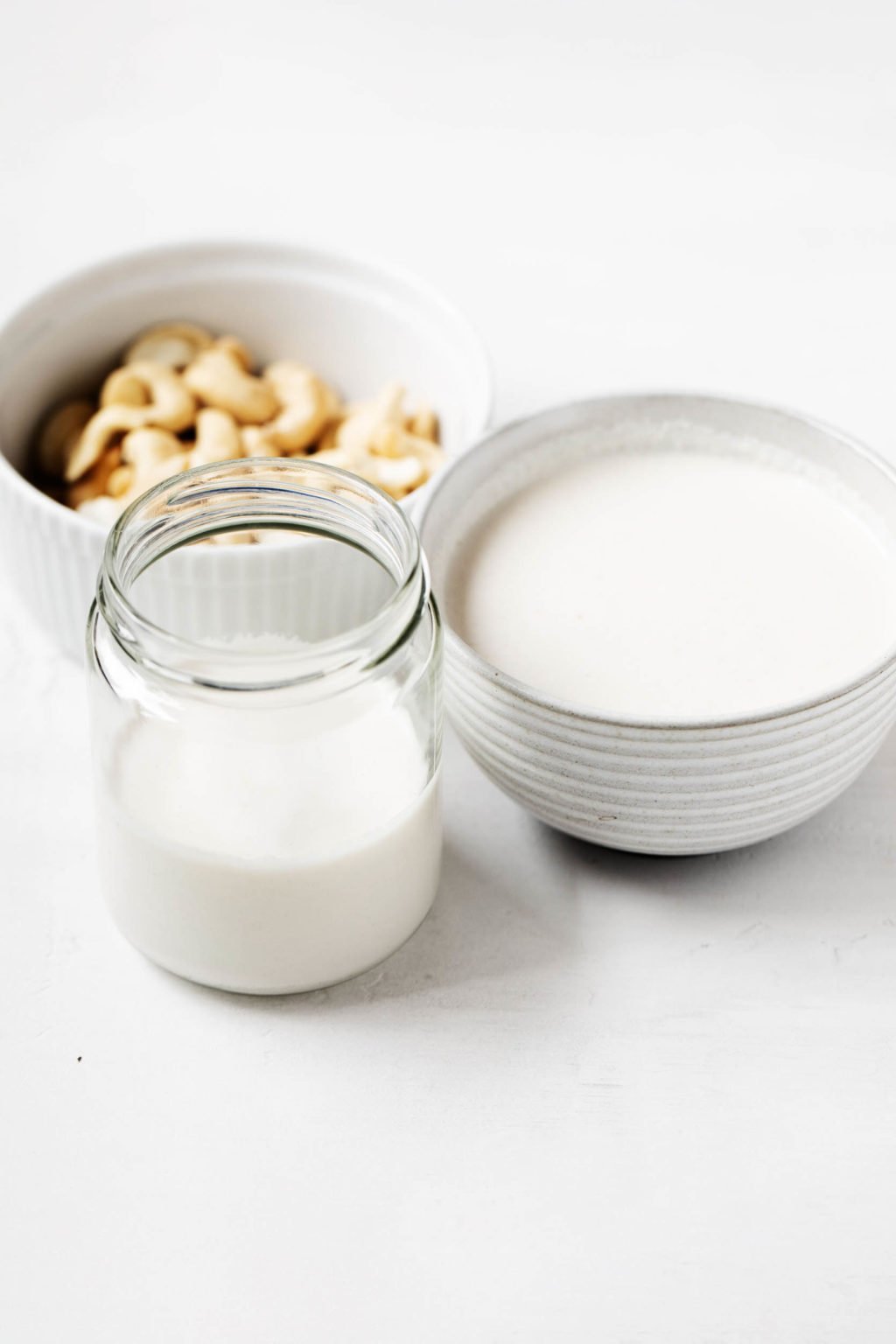
In place of yogurt, you could use my all-purpose cashew cream for a super creamy effect.
Ingredients for protein-rich vegan overnight oats
What makes these vegan overnight oats rich in protein? And more importantly, why does it matter?
I’ll answer the second question first.
What’s so special about protein with breakfast?
For one thing, protein is associated with satiety.
Have you ever made a bowl of oatmeal and enjoyed it, only to feel hungry an hour later?
Even if you’ve got some snacks to fall back on, the lack of breakfast satisfaction isn’t a nice sensation—especially when there’s a long, busy morning ahead.
Packing your overnight oats with plant-based sources of protein will help to prevent nagging hunger after you eat.
For those who have reason to monitor blood sugar, protein tends to help control the blood glucose response after meals. This may be especially important in the morning, when blood sugars tend to be higher.
There’s other value in emphasizing protein at any time of day.
Protein is associated with strong immunity. It’s used to produce antibodies that protect us from antigens like foreign bacteria and viruses.
Protein is also called upon to replace and repair tissues in the body. Dietary protein is associated with protection of lean muscle mass. Increasingly, research suggests that protein consumption might have a protective effect on the bone matrix, too.
For all of these reasons, I encourage my clients to eat protein with breakfast.
A traditional “high protein” breakfast might lean heavily on animal proteins, such as eggs or breakfast meats.
In the context of a vegan diet, protein doesn’t have to be a single item. Instead, protein can be synergistically sourced from different plant foods.
In fact, there’s a recently updated protein primer that lives on this blog, called 15 simple, protein-rich combinations of plant foods. It’s all about mixing and matching every day vegan foods in order to create protein-rich meals. (The post also speaks to some commonly asked questions about protein for vegans.)
The ingredients in these vegan overnight oats each contribute an amount of protein that contributes to a protein-rich whole. The total has almost twenty grams of protein, which is a solid amount for breakfast.
Speaking of those protein-supplying ingredients, let’s go through them.
Rolled oats
Again, rolled oats are my oatmeal of choice for making overnight oats. However, if you have quick oats at home and would rather use them, they will work, too.
If you like, you can replace the oats with rolled barley or spelt flakes. Both types of grains, which are sold as breakfast cereals, work similarly to rolled oats.

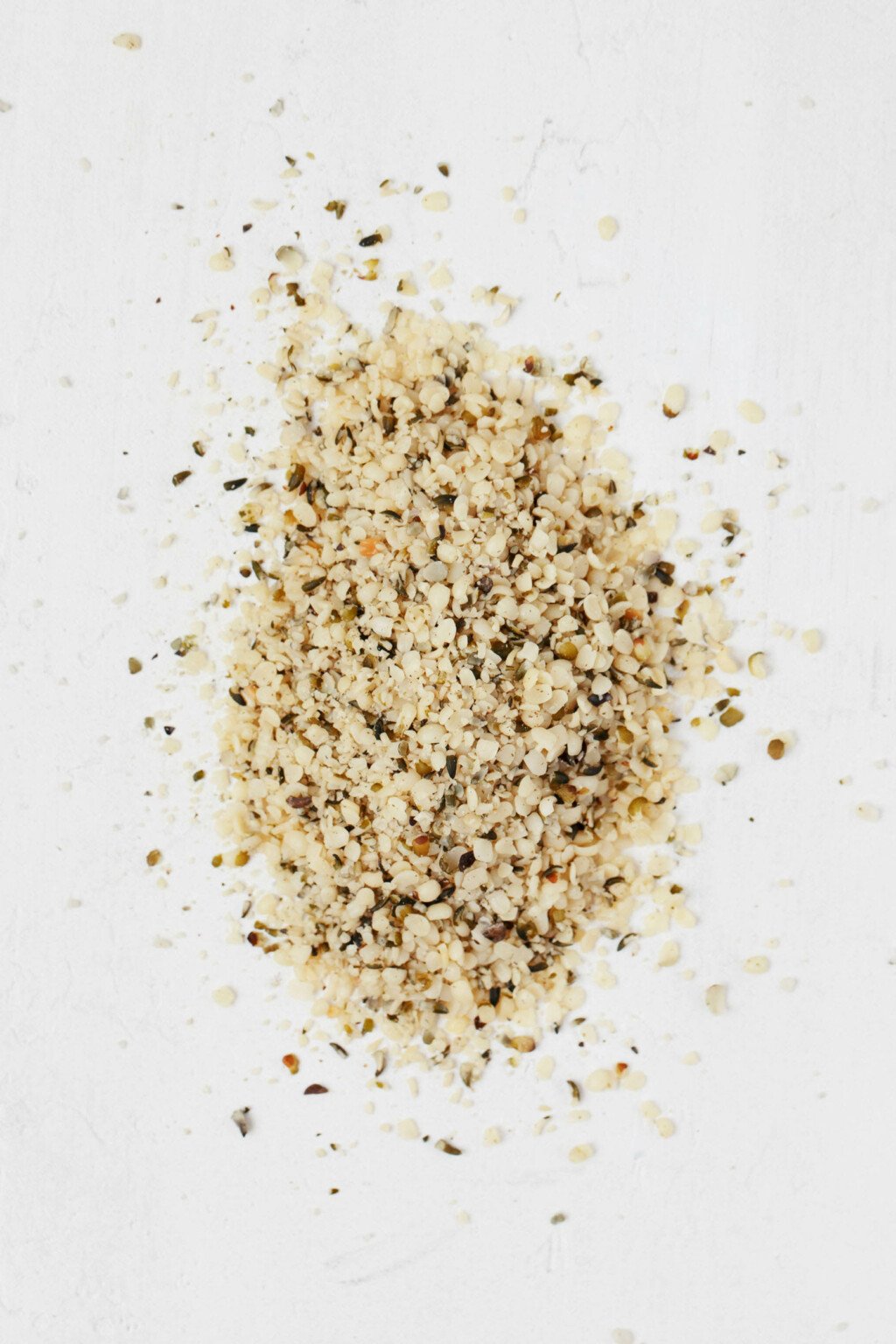
Shelled hemp seeds (aka hemp hearts)
Hemp seeds are mighty little protein sources. Three tablespoons of shelled hemp seeds, which are also sometimes called hemp hearts, has ten grams of protein.
Hemp seeds also supply alpha-linolenic acid (ALA), or Omega-3 fatty acid. This type of fatty acid is associated, among other things, with contributing to healthful blood lipids. It may also have a positive impact on cognitive function.
Chia seeds
Chia seeds are another source of ALA, and they also make an appearance in the overnight oats. Their main purpose in the recipe is for texture: they help to thicken the overnight oats by plumping up as they’re soaked.
I tend to like overnight oats that are a lot of oats and only a little bit of chia. Oats give me more energy and fullness than do chia seeds, and too much chia can make overnight oats gluey.
If you love the texture of chia, however, you can add more than the teaspoon called for in the recipe.
Soy milk
With many plant milks to choose from nowadays, soy milk is still my number one choice for everyday vegan breakfasts and recipes. (Oat milk is my favorite for cappuccinos and lattes, but that’s another story!)
Why the preference for soy? Because it has the most robust nutritional profile among plant milks.
Soy milk provides:
- Protein
- Omega-3 fatty acids
- Potassium
- Soy isoflavones (phytoestrogens) that are associated with heart health and reduced incidence of certain cancers
- If fortified, calcium and Vitamin D
Other commercial plant milks may be fortified, but they rarely supply as many key nutrients as soy. Soy milk contributes all of those nutrients, protein especially, to the vegan overnight oats.
If you need a substitute because of a soy allergy or personal preference, I’d recommend another plant milk with some protein. Some examples would be pea milk, such as the Ripple brand, or hemp milk.
How to make overnight oats
The process of making vegan overnight oats is really simple, which is all the more reason to make this dish your go-to if breakfast has been eluding you lately.
The steps outlined below, and the protein-rich overnight oats that I’m sharing today, are scaled for a single serving. However, you can double, triple, or quadruple it as needed, if you’d like to meal prep for several days at a time.
When I do this, I just use multiple mason jars (or containers) and prepare them simultaneously.
Step 1: Mix dry ingredients
In the container that you plan to store and eat the overnight oats out of, mix your oats, chia seeds, shelled hemp seeds, and salt.
Step 2: Add the wet ingredients and stir
Next, you’ll add your soy milk and maple syrup to the container. Stir everything well, so that the liquid and dry ingredients are fully mixed.
Step 3: Cover and refrigerate
Cover your container with an airtight lid and transfer it to the fridge. Store the oats in there overnight.
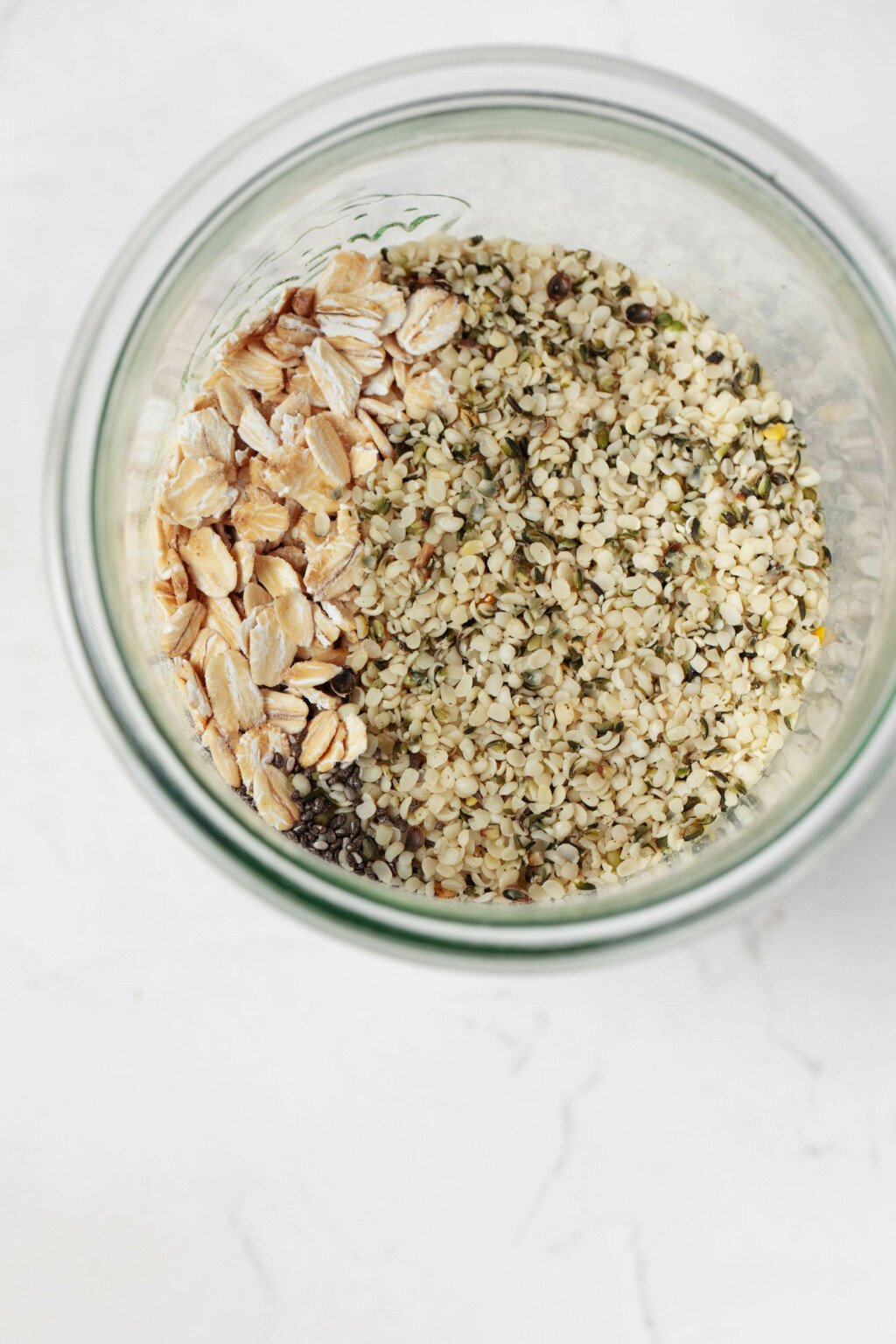
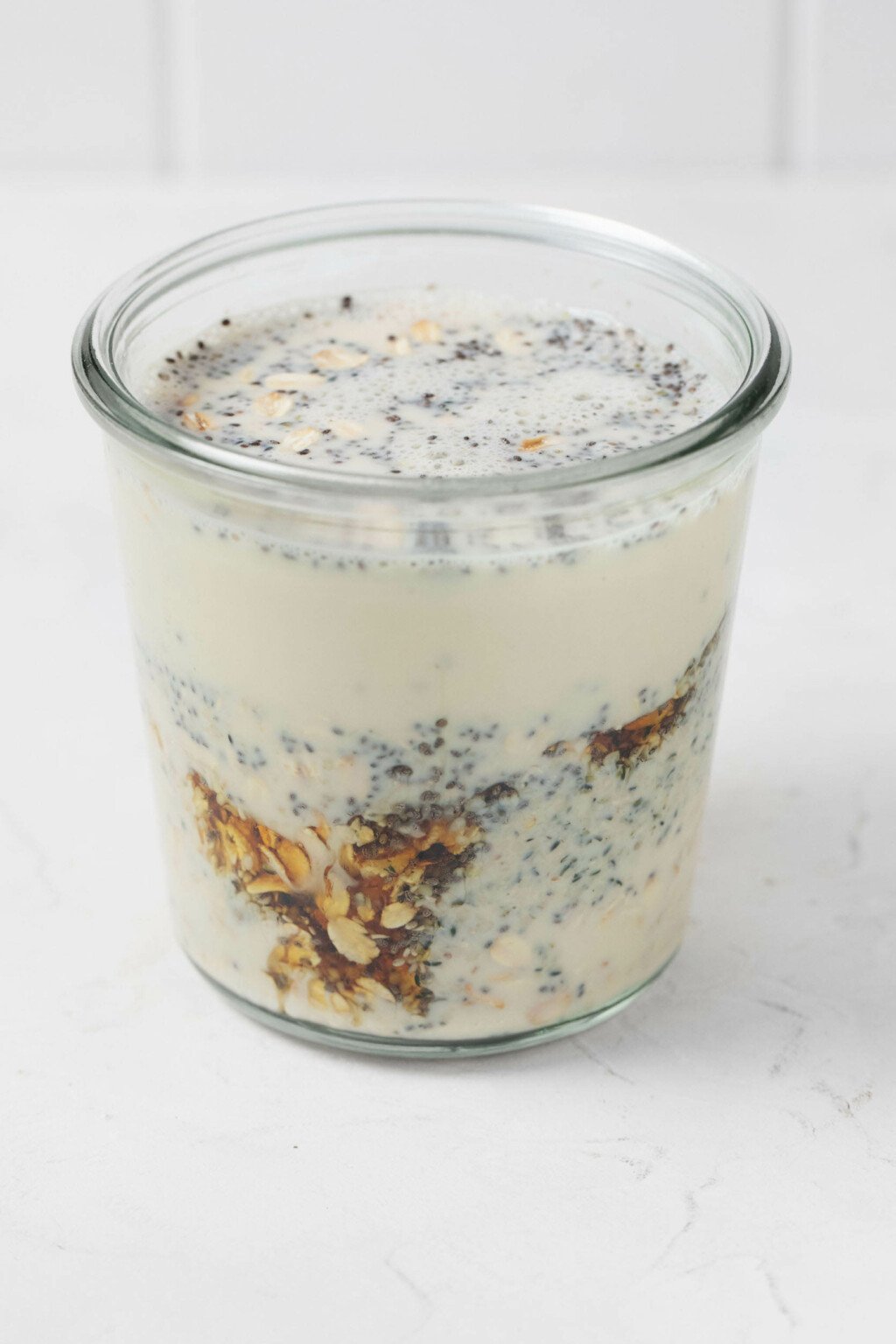
Step 4: Enjoy with toppings or mix-ins of choice
My favorite to enjoy these protein-rich overnight oats is with a sliced banana. I mix in the banana in the morning, so that it doesn’t turn too mushy while the oats are soaking overnight.
The banana adds sweetness and texture, not to mention some potassium, to the oatmeal.
However, you can also add another type of chopped or dried fruit to the oats when you wake up—anything that you’re eager to serve them with.
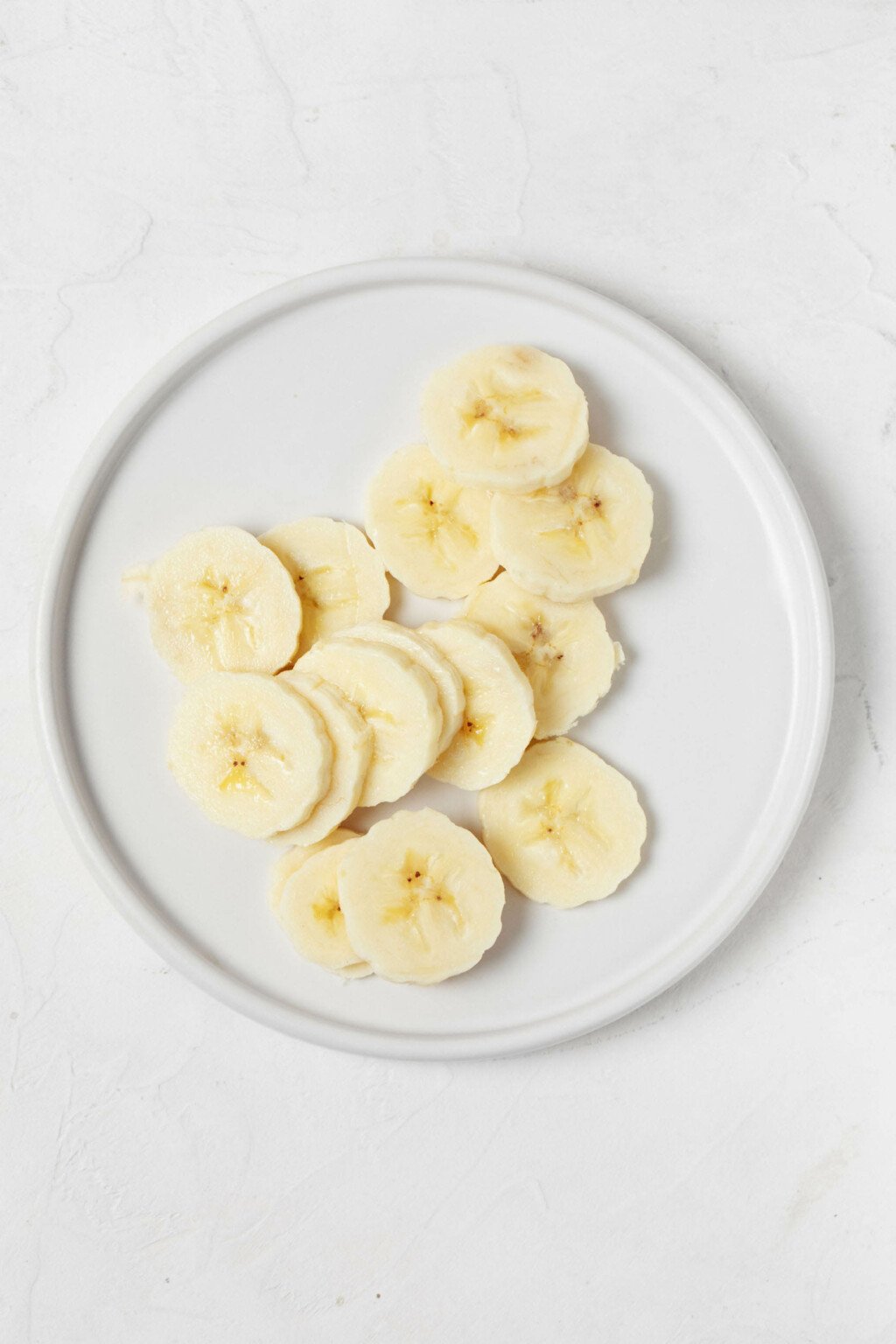

Can I soak the overnight oats for less than 8 hours, or overnight?
Suppose you want to enjoy these overnight oats as a snack in the afternoon, or you’re a very early riser who wants to have them for breakfast a few hours after waking.
Is an overnight soak—about eight hours, give or take—necessary?
No, it’s not. I find that the oats aren’t tender enough for my liking with any less than four hours of soaking. But four hours or more will definitely be enough time for the oats to soak up and the chia seeds to become plump.
If you’re awake at 5 or 6am and want your oats around 9 or 10am, or you’re preparing them midday for a late afternoon snack, a quicker soak will work.
How long can overnight oats last in the fridge?
Once mixed and prepared, the overnight oats can sit in the fridge for up to five days.
I recommend adding perishable mix-ins, like blueberries, banana slices, or other fruit, up to 1 day prior to eating.
The best storage containers for overnight oats
I love a glass jar for my vegan overnight oats, but it’s important to choose one that has a few inches of empty head space on top.
This will give the oats room to expand, if you freeze them. It also gives you space to add plenty of fruit in the morning.
A 12-16 ounce capacity jar works well. My personal favorites are these Le Parfait jam jars and these Weck jars.
I also love my 16-ounce W&P Seal Tight Glass Bowls for overnight oats.
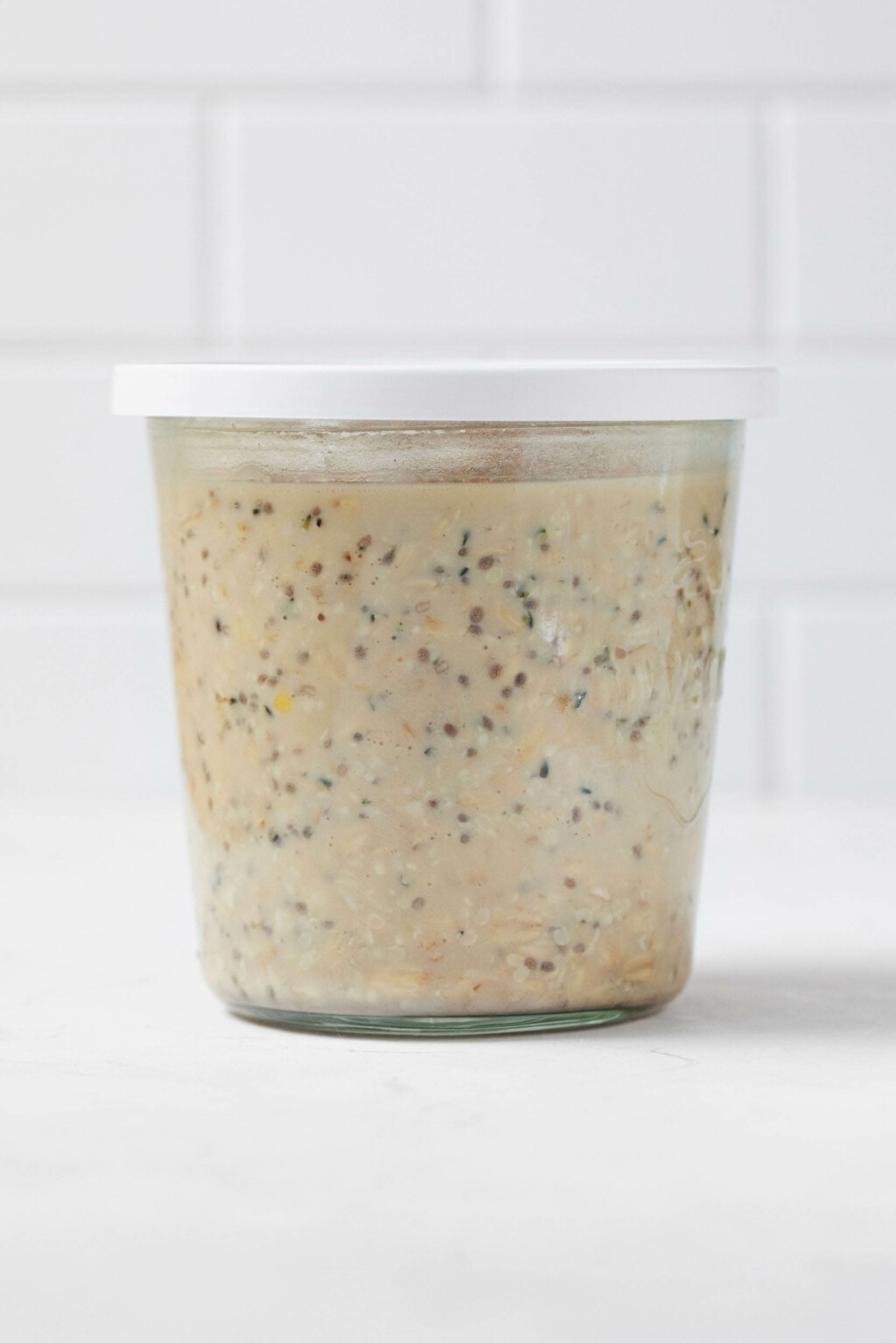
Can I freeze overnight oats?
Yes, absolutely! Once frozen, overnight oats can keep for up to 8 weeks in the freezer.
Be sure to store them in a container that has some empty head space on top of the oats, so that they don’t risk expanding and shattering their storage vessel while they freeze.
To defrost, I recommend a full 48 hours of defrosting in the fridge. When I transfer my overnight oats from the freezer to the fridge, it can often take a full two days for them to defrost and soften for eating.
Another way to get ahead on your meal prep is to distribute the dry components of the protein-rich vegan overnight oats into mason jars a few weeks in advance. Then, you can add the liquid components and mix the night before you’re ready to enjoy them.
Vegan overnight oats might be the easiest make-ahead breakfast, but they’re not the only idea that I have for you.
As an enthusiastic breakfast eater, I’ve come up with lots of ideas that can be made over the weekend and grabbed as you walk out the door on weekday mornings.
Here are some favorites:
And if you love this recipe, then you might also want to check out my vanilla pumpkin overnight oats and banana mocha overnight oats.
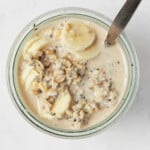
Yields: 1 serving
- 1/2 cup rolled oats (40g)
- 1 teaspoon chia seeds
- 2 tablespoons shelled hemp seeds
- Pinch salt
- 3/4 cup plain soy milk (180ml)
- 1-2 teaspoons maple syrup (adjust to taste or substitute one chopped, pitted medjool date)
- 1 banana, sliced (or another fruit mix-in of choice)
-
Place the oats, chia seeds, shelled hemp seeds, and salt in a mason jar or airtight storage container and stir. Add the soy milk and maple syrup and stir again, till the ingredients are well mixed. Cover the container and transfer it to the fridge. Allow the oats to soak overnight.
-
In the morning, stir the oats again. If they’ve become too thick for your liking, you can add an extra tablespoon or two of soy milk.
-
To serve, top the oats with the sliced banana or stir the slices into the oats, incorporating them throughout. Enjoy!
It’s great when any meal can be efficient, easy, tasty, and nutritious at the same time. I think that these overnight oats are a good example of that, and I love starting my day with them.
I hope you’ll agree! Maybe you’ll try meal prepping them this weekend?
Happy Friday, friends.
xo

